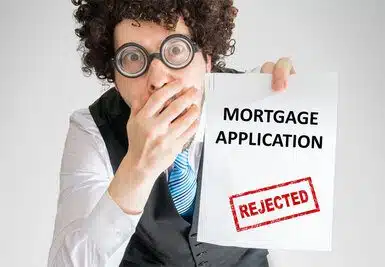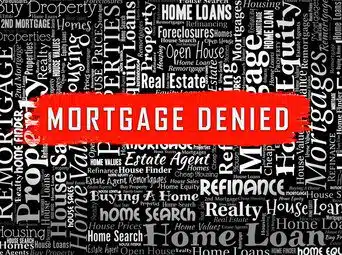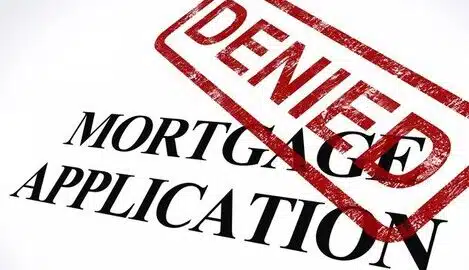We hear the phrase “My mortgage application was declined” on almost a daily basis. With the current tight lending rules, having a mortgage application declined by the bank is an all too common occurrence. It can be very discouraging, but don’t lose hope; there are usually options available to overcome your home loan obstacles.
It is not over if your mortgage application was declined
It’s usual for a bank to require a 3-6 month stand down after they decline an application, after which you can reapply. They’ll inform you of the actual period as part of the application process. But (more importantly) there is nothing to stop you applying straight away with another lender. The key thing is to understand why you were declined by your initial chosen lender. You can then take any action needed to rectify the issues.

The importance of using a mortgage broker
We realise that a mortgage broking company saying you need a mortgage broker is hardly impartial advice. But our reasoning is compelling. Your mortgage broker will be able to look at your situation and walk you through why you were declined previously. They’ll then be able to advise you on what needs to be done to be successful in getting a home loan. They’ll look across all lenders, and with their industry knowledge of what the current acceptance criteria is from lender to lender, they’ll know where you are likely to be approved. This is huge, as lending criteria is individual to each lender and it changes all the time.
Understand why your mortgage application was declined
The majority of applications get declined due to one or more of the following reasons:
- Not enough deposit
- Not enough income
- A bad credit score
Once you understand why you were declined, you can discuss with your mortgage broker whether a different bank may accept your application. The banks each use different formulas when assessing whether a mortgage meets their “affordability” threshold. An application could be rejected for not enough income at one bank but accepted at another. Banks sometimes offer mortgages at under 20% deposit, your mortgage broker will know if this is an option currently available and whether you would meet the criteria.
If none are likely to, that leads us to…
Banks aren’t the only option when looking for a mortgage
The stringent lending rules among the banks can mean that an applicant who is perfectly capable of servicing a mortgage still gets declined by the banks. This is where a non-bank lender/second tier lender can be a good option. They accept many applications that the banks decline. The flipside is they charge higher interest rates, but many people find it a worthwhile compromise to get on the property ladder.
If you do go with a second tier lender, make sure to make a financial plan to get yourself in a position to move to a bank within a couple of years to avoid paying higher interest long term.
Non-bank lenders are often a good fit if:
- You’re newly self-employed. Usually the banks don’t approve lending to someone who has been self-employed for less than two years.
- Your income doesn’t meet the banks’ standards (but is still high enough to service a mortgage without hardship).
- You don’t quite have enough deposit for the banks.
- You’ve been recently discharged from bankruptcy.
- You have a low credit score.

What to do if you don’t currently meet the lending criteria or your home loan is declined
Next steps if you don’t have enough income
Reducing any debt is often the best place to start increasing your income. The banks minus any loan repayments when calculating your mortgage, and they assume the repayments will continue indefinitely. So if you’ve got any loans close to being paid off it could be worth doing so sooner rather than later. Of course, this could eat into your deposit so it’s a balancing act.
The banks also assume any credit cards or overdrafts will be maxed out. Therefore they calculate your income on the basis you will be making the maximum payments each month. They don’t take into account whether or not you pay your credit card off each month. Reduce your credit limits where possible, or better yet, cancel your credit cards and overdrafts.
Beyond reducing debt, increasing income can be tricky. Kiwi’s aren’t great at asking for a raise but if you can find the courage then it could be the difference between getting your own home or not. Look for opportunities for career progression within your job or even a job change if it will provide more opportunity and salary. We know these are not easy changes to make! If you do decide to go for it, make a plan and break it down into steps. Focusing on one step at a time will make the big moves feel much more manageable.
Next steps if you don’t have enough deposit
If you don’t have enough deposit, make sure you’ve looked into using your KiwiSaver and whether you qualify for the First Home Loan or First Home Grant. If it’s a matter of saving more, then make a budget and put savings aside regularly. An automatic transfer of your budgeted savings to a separate account each pay day can really help you stay on track.
Next steps if you have a bad credit report
As advised previously, second tier lenders are often a viable option for those with bad credit scores. Don’t assume you don’t have borrowing options without first speaking to a broker.
If you have a bad credit score, make sure you check the details are correct. It can be a challenge to get them rectified, but is worth pursuing it if it changes your score from bad to good.
If your report is correct then it becomes a matter of improving your credit score. This means reducing credit limits, paying bills on time and paying off hire purchases! You could even consider completing a debt consolidation to reduce the overall interest rates being paid.
Ultimately, the steps you need to take and the options available to you when applying for a mortgage are very much dependant on your specific circumstances. So we hope we’ve convinced you that a mortgage broker is advisable whenever you are looking for a mortgage, but especially so if you’ve been going it alone and have had a mortgage application declined.
Platinum Mortgages specialises in mortgage solutions for those who can’t get straight forward approval from a bank. Reach out for a no-obligation chat about your circumstances and whether we can help.



